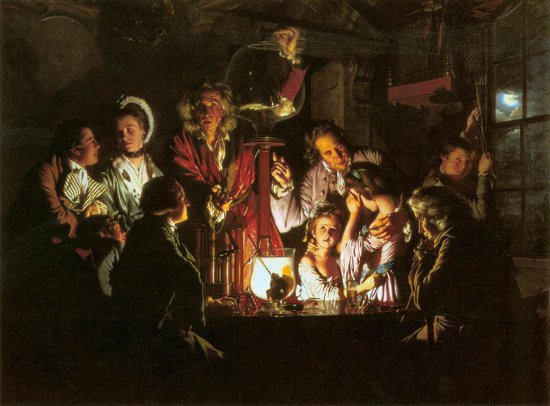
Joseph Wright’s An Experiment on a Bird in the Air Pump
I did everything in my power a few months back to avoid all news about the British Royal Wedding that had so many Americans captivated. It was disheartening to see the American media paying so much attention to the antiquated and irrelevant institution of the Royal Family. It just seemed more than a little hypocritical as totalitarian rulers appointed by god are the antithesis of a country founded on the consent of the governed, a principle for which we had endured a bloody revolution to extricate ourselves from their rule.
Thomas Paine in his pamphlet Common Sense, the document that inspired the Declaration of Independence and provided an outline for the American system of Representative Democracy, put it most eloquently:
But where, says some, is the King of America? I’ll tell you. Friend, he reigns above, and doth not make havoc of mankind like the Royal Brute of Britain. Yet that we may not appear to be defective even in earthly honors, let a day be solemnly set apart for proclaiming the charter; let it be brought forth placed on the divine law, the word of God; let a crown be placed thereon, by which the world may know, that so far as we approve of monarchy, that in America THE LAW IS KING. For as in absolute governments the King is law, so in free countries the law OUGHT to be King; and there ought to be no other. But lest any ill use should afterwards arise, let the crown at the conclusion of the ceremony, be demolished, and scattered among the people whose right it is. [emphasis mine]
This revolutionary idea on which America was founded was inspired by the Age of Enlightenment, an intellectual movement that spawned so many of the ideas we take for granted today, but also one that we underappreciate or appear to have event forgotten in our academic institutions.
What is the Enlightenment?
Temple University’s Intellectual Heritage Program provides this list of Enlightenment values:
- a deep commitment to reason,
- a trust in the emerging modern sciences to solve problems and provide control over nature,
- a commitment to the idea of progress in material wealth and in human civility,
- a belief in the essential goodness of human nature,
- an emphasis upon the individual as master of his fate and fortune, and
- an engagement with the public sphere of discussion and action.
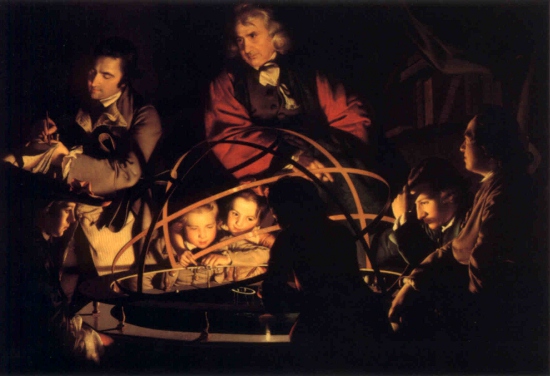
Joseph Wright’s A Philosopher Lecturing on the Orrery
Voltaire, Diderot, d’Alembert, Spinoza, Émilie du Châtelet, Locke, Thomas Paine, Thomas Jefferson, Newton, Adam Smith, and Francis Bacon were just a few of the great minds who contributed to the Age of Reason or were greatly inspired by it. They were known as philosophes, the intellectuals challenging the established paradigms of their time and arguing for freedom of expression, inquiry, tolerance, and an emphasis on human progress. Immanuel Kant most succinctly expressed it:
Enlightenment is man’s emergence from his self-imposed immaturity. Immaturity is the inability to use one’s understanding without guidance from another. This immaturity is self-imposed when its cause lies not in lack of understanding, but in lack of resolve and courage to use it without guidance from another. Sapere Aude! [dare to know] “Have courage to use your own understanding!”–that is the motto of enlightenment.
The Enlightenment was a time where the scientific method was popularized and the ideal of looking to nature for a more accurate understanding of our world came into prominence. It was a rebellion against the established superstitious dictates of the time that established tyrants empowered by God instead of leaders appointed by consensus. It brought an end to the millennium-long period of stagnation that was the Dark Ages and brought the Western world back into an era of human progress that continues to this day.
The Impact of the Enlightenment
Although the Enlightenment is most strongly associated with cultural shifts in Europe, America’s Founding Fathers were mostly scholars of the Enlightenment. The introduction to the Declaration of Independence affirms the right of human beings “to assume among the powers of the earth, the separate and equal station to which the Laws of Nature and of Nature’s God entitle them…” The Founding Fathers filled the Jefferson Reading Room at the Library of Congress with tributes to the sciences and Age of Reason quotes. As Thomas Paine argues in his controversial book Age of Reason, “Those who knew Benjamin Franklin will recollect, that his mind was ever young; his temper ever serene; science, that never grows grey, was always his mistress.” Carl Sagan describes this scientific bent of Americas figure heads in his book Demon-Haunted World:
Dr Benjamin Franklin was revered in Europe and America as the founder of the new field of electrical physics. At the Constitutional Convention of 1789 John Adams repeatedly appealed to the analogy of mechanical balance in machines; others to William Harvey’s discovery of the circulation of the blood. Late in life Adams wrote, ‘All mankind are chemists from their cradles to their graves . . . The Material Universe is a chemical experiment.’ James Madison used chemical and biological metaphors in The Federalist Papers. The American revolutionaries were creatures of the European Enlightenment which provides an essential background for understanding the origins and purpose of the United States.
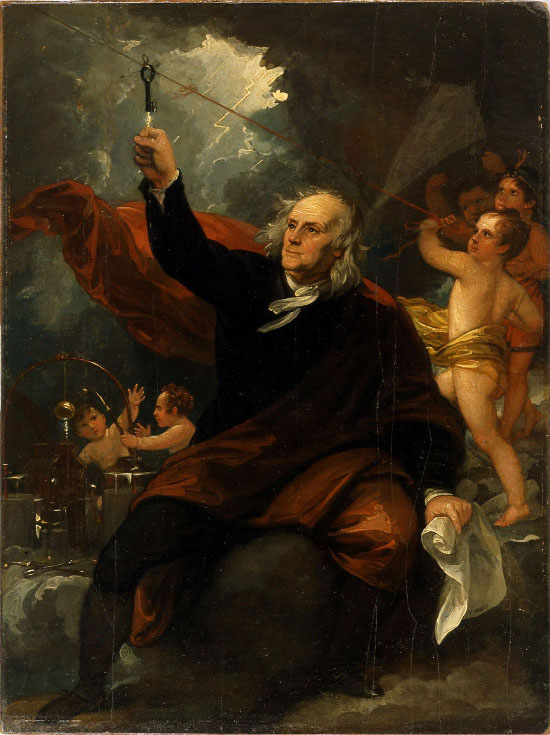
Benjamin West’s Benjamin Franklin Drawing Electricity from the Sky
The philosophes are associated with having the greatest impact on European culture, but I would argue that they so strongly influenced the American Revolution and the founding of our democracy, events which led to the United States eventually becoming the most powerful and culturally-influential country on the planet, that the impact of their ideas changed the entire world.
Where Does the Enlightenment Fit in Academia?
I started this article in response to my discovery that there are numerous texts that were prominent in this age that are still inaccessible on the World Wide Web. Most notably, I was unable to find an English translation of Voltaire’s Elements of the Philosophy of Newton, a book that established this intellectual as having a powerful understanding of science in addition to exhibiting a strong wit. Nor was I able to find any translations of Emilie du Chatelet’s many science texts, which I was strongly interested in for her close collaborations with Voltaire and who is often credited with inspiring his scientific writing. As my online research met dead end after dead end, I also started to ruminate on the fact that I had only heard of the Age of Enlightenment and its many brilliant authors a few years ago.
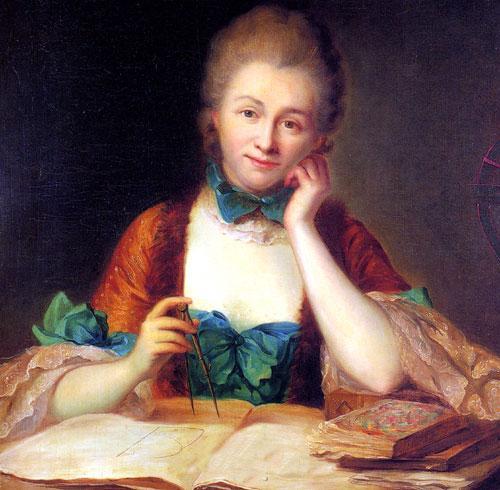
Emilie du Chatelet
Why was I never introduced to this crucial period of intellectual thought in school? In Virginia Tech’s English program, I went completely unexposed to the brilliant minds thriving in this era of reason. Looking through the University’s Literature, Language, & Culture Curriculum turns up no courses focused on Enlightenment literature. The Closest we get is Victorian Literature focusing solely on the British literary perspective on this incredibly revolutionary time, and named after a queen who did nothing to advance the cause (It was Russia’s Catherine the Great who deserves credit for nurturing the heroes of the Enlightenment.).
It could be argued that the Age of Enlightenment was one of philosophical thought, and should be relegated to that department, but then we are left with the disparity of so many English departments providing courses in Romanticism’s Counter-Enlightenment which devolved culture to focus on idyllic nostalgia for the past, nationalism in the name of tradition, and the reemergence of superstition and irrationality to fill the world with imaginary beauty instead of appreciating its natural wonders.
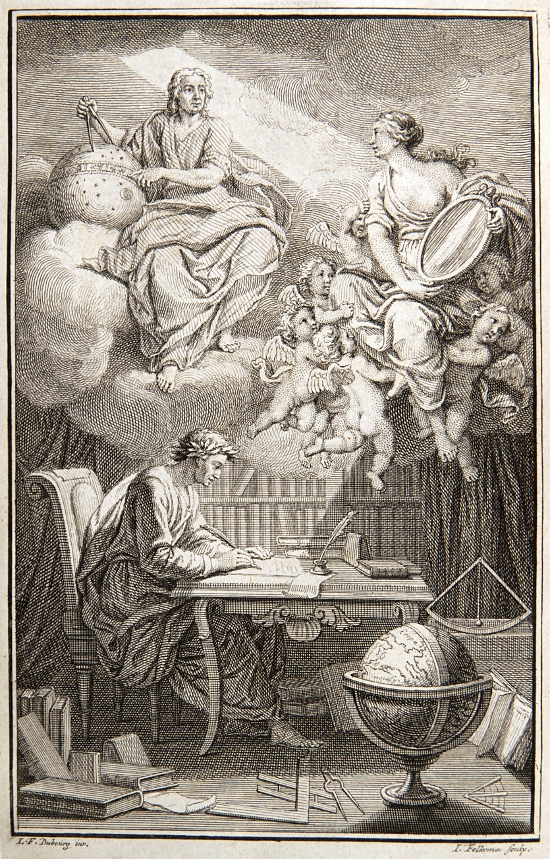
Frontpiece to Voltaire’s Elements of the Philosophy of Newton
Depicting Emilie du Chatlet reflecting Newton’s wisdom to Voltaire
Additionally, so many philosophe works have no place in philosophy because they are early works of science. To quote The author Edward Bulwer-Lytton, “In science, read, by preference, the newest works; in literature the oldest.” This strikes at the heart of why Enlightenment studies are so difficult to find in the Academic Universe. The majority of Enlightenment authors are banished to limbo, their hypotheses and speculations overcome by events. Scientists don’t want to read ideas that are wrong, even if they were a crucial step in formulating the ideas that were right. Aristotle’s Physics seems silly and immature in its reasoning after many of its ideas were later disproved by Ibn Al-Haytham, the first scientist, and later Galileo.
Science has no need for Denis Diderot, the philosophe responsible for inventing the Encyclopedia, because his lifetime of tireless work to categorize and disseminate the entire knowledge of the Western world quickly became obsolete, replaced by newer Encyclopedias of increasing accuracy eventually leading to Britannica Sets and Wikipedia. But there are so many profound ideas in Diderot’s version that it would be a tragedy to lose them. Consider this passage from the Encyclopedia entry for “Encyclopedia” where he argues that this innovation could only emerge in an enlightened age:
I have I have said I have said that it could only belong to a philosophical age to attempt an encyclopidie; and I have said this because such a work constantly demands more intellectual daring than is commonly found in ages of pusillanimous taste. All things must be examined, debated, investigated without exception and without regard for anyone’s feelings. . . . We must ride roughshod over all these ancient puerilities, overturn the barriers that reason never erected, give back to the arts and sciences the needed a reasoning age when men would no longer seek the rules in classical authors but in nature, when men would be conscious of what is false and true about so many arbitrary treatises on aesthetics: and I take the term treatise on aesthetics in its most general meaning, that of a system of given rules to which it is claimed that one must conform in any genre whatsoever in order to succeed…
This is not a scientific passage, but it is strongly relevant to modern scientific thought’s virtue of skepticism and challenging established paradigms. Much of the Age of Enlightenment seems to fall into that gray zone between the humanities and the sciences, where the profound concepts of peer review, skepticism, and Empiricism that we take for granted today were formulated but neither the sciences nor the humanities wants to revel in their achievements.
A Perpetual Age of Enlightenment
It’s important to remember that the Enlightenment, like the Sciences that owe so much to it, is not a destination, but a journey. As Kant wrote:
If it is now asked, “Do we presently live in an enlightened age?” the answer is, “No, but we do live in an age of enlightenment.” As matters now stand, a great deal is still lacking in order for men as a whole to be, or even to put themselves into a position to be able without external guidance to apply understanding confidently to religious issues. But we do have clear indications that the way is now being opened for men to proceed freely in this direction and that the obstacles to general enlightenment–to their release from their self-imposed immaturity–are gradually diminishing. In this regard, this age is the age of enlightenment, the century of Frederick.
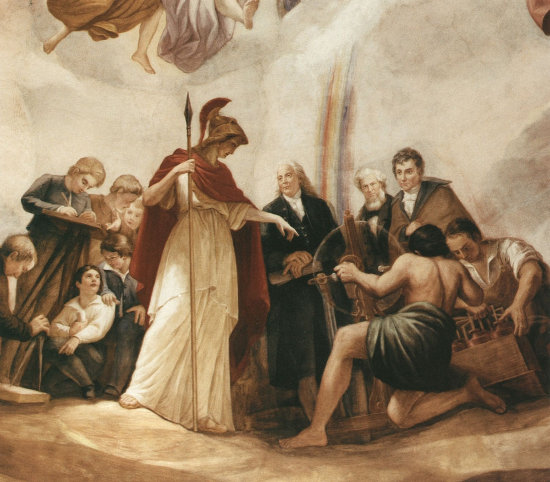
Constantino Brumidi’s The Apotheosis of Washington: Science
Minerva teaching Benjamin Franklin, Robert Fulton, and Samuel F.B. Morse
We define the Enlightenment as a period in time, but it remains strongly with us today. We don’t think about the fact that providing empirical evidence to back up our claims was once considered a revolutionary idea that met with resistance from established theological authorities or that our democratic, academic, and scientific institutions were only established by challenging and even revolting against that authority. But we do live in an age of continual progress just as Kant describes in his own era. We continue to push the boundaries of nature with space probes, particle accelerators, microcosmic explorations, and psychological studies that perpetually challenge our established understandings of the world around us.
Whether we acknowledge the origins of our modern way of thinking or not, we are very much living in an extension of the Age of Reason. We are many of us philosophes, challenging and exploring in a culture where free inquiry is at least encouraged, although certainly not revered. We are incredibly advanced in our understanding of the world in comparison to those who lived in Kant’s time, but we have still not reached Enlightenment.
Comments
3 responses to “Why the Age of Enlightenment Matters”